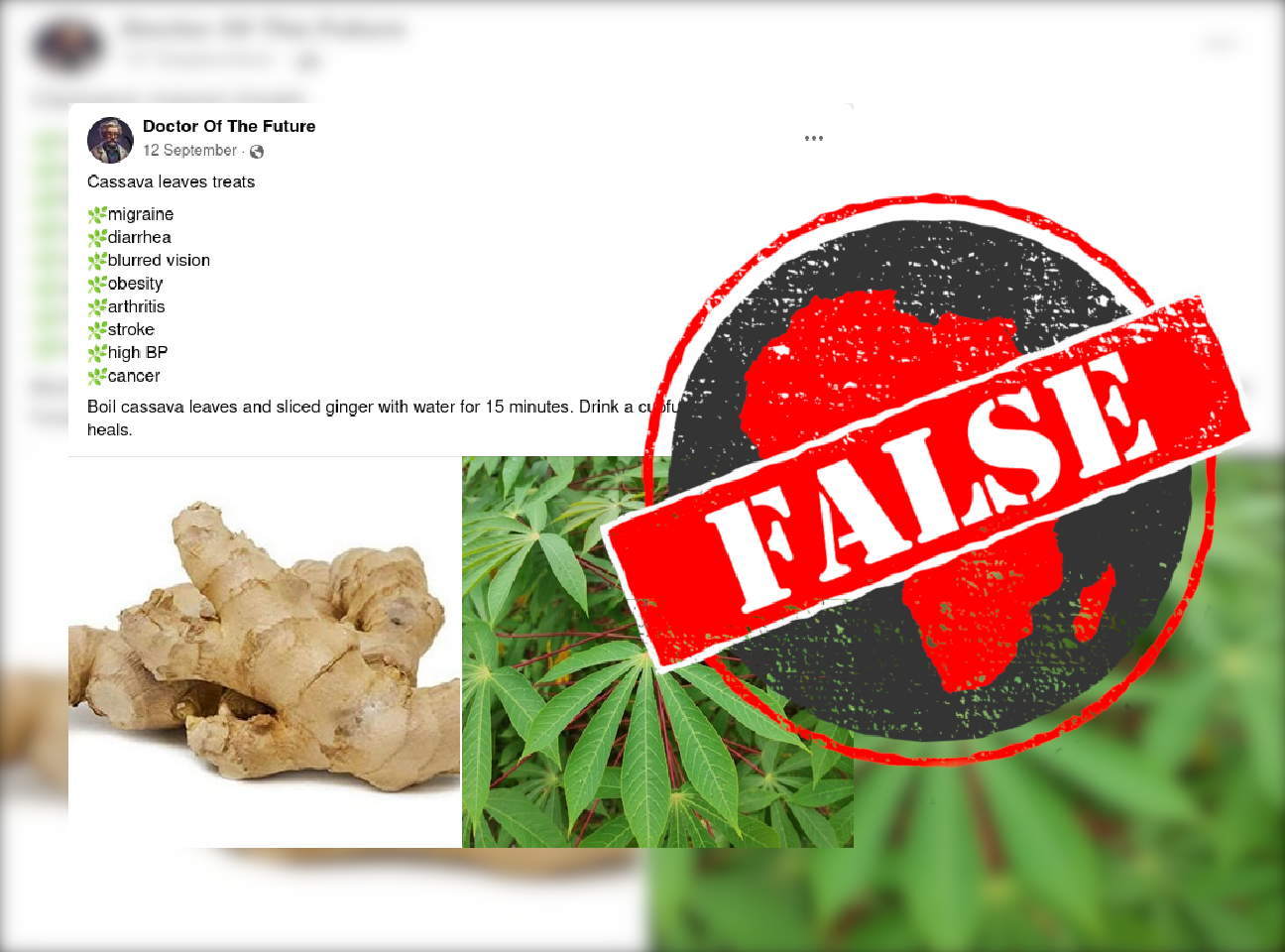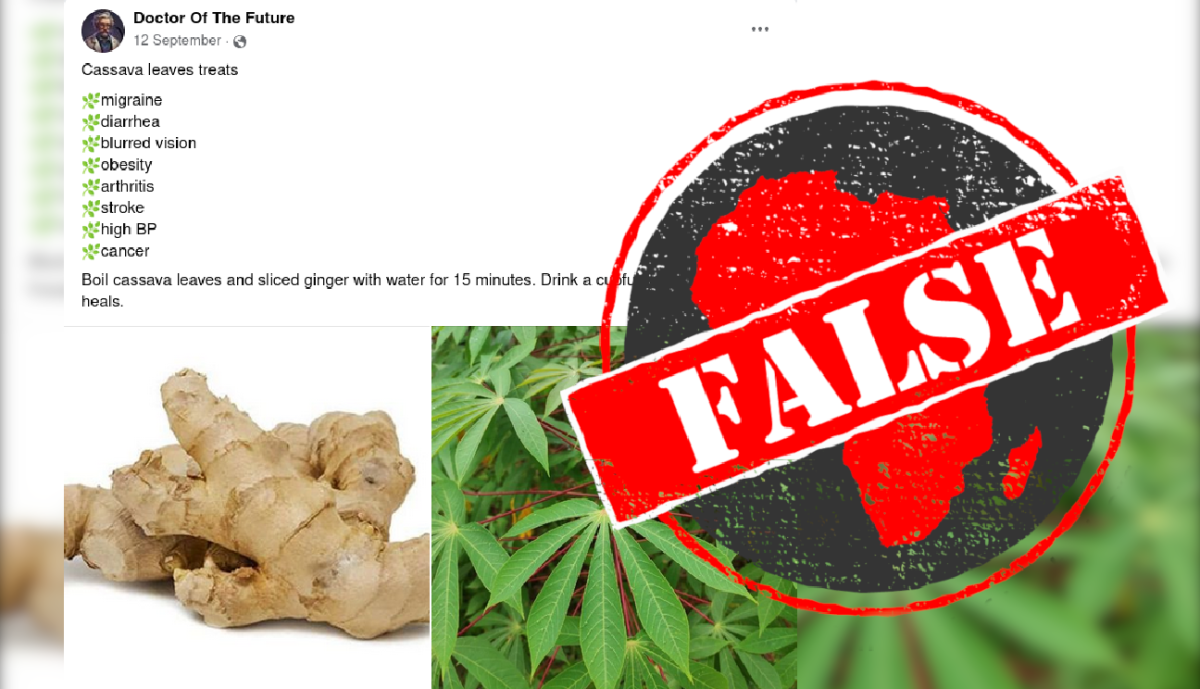IN SHORT: A Facebook account claims that cassava leaves can cure a range of diseases, including cancer, diabetes and high blood pressure. But there is no evidence for this. You should consult a doctor.
A number of Facebook posts claim that cassava leaves can be used to treat a wide range of ailments and conditions, including high blood pressure, cancer, uterine fibroids and food poisoning.
One post, published 1 March 2023 on a group with 14,800 members, gives instructions on how to prepare the herbal remedy: “Gather enough cassava leaf, wash them in a clean water, arrange it inside a cooking pot, add clean water into it and boil till the colour of the leaf changes at least for about 15-20 minutes. bring it down, pour out the water in a glass container for preservation and add enough natural honey into it.”
The post provides no evidence for the claim but directs users to “drink a full glass cup every morning for all the aforementioned sicknesses except diabetes stroke and monthly flow issues”.
Cassava is a perennial woody plant with an edible root that grows in tropical and subtropical areas of the world. It grows well in sandy or loamy soils with good drainage. Cassava leaves contain vitamins B and C, beta-carotene and potassium.
Similar claims about the efficacy of cassava leaves in treating several health problems are made here, here, here and here.
But can drinking a simple infusion of cassava leaves treat such a wide range of serious diseases?

Understanding some of the medical conditions listed
A stroke, sometimes called a brain attack, occurs when something blocks the blood supply to a part of the brain.
High blood pressure, also called hypertension, is blood pressure that is higher than normal. The higher your blood pressure levels, the higher your risk of other health problems, such as heart disease, heart attack and stroke.
Cancer is the name given to a wide range of diseases in which body cells grow out of control and spread to other parts of the body.
Fibroids are non-cancerous growths that develop in or around a woman’s womb.
Typhoid fever is a life-threatening infection caused by the bacterium Salmonella typhi. It is usually spread through contaminated food or water.
Diabetes is a chronic, metabolic disease characterised by high levels of blood glucose (or blood sugar), which over time can cause serious damage to the heart, blood vessels, eyes, kidneys and nerves. Blurred vision is another complication of diabetes.
Malaria is a disease caused by a parasite that is commonly found in certain types of mosquitoes and transmitted to humans.
Consult your doctor, say medical professionals
Some studies have found that cassava varieties have antioxidant and anti-inflammatory properties. Amygdalin extracts from cassava leaves have been shown to have anticancer properties in cancer-prone rats.
However, other studies have also reported that high levels of amygdalin ingested directly can be toxic to humans. So the evidence on the health effects of cassava are mixed.
Pharmacist Azubueze Ikejiani told Africa Check that although cassava leaves are generally healthy, it is advisable for a patient with any of the listed ailments to see a doctor.
Africa Check also spoke to Dr Johnson Udodi, a registrar at the National Hospital Abuja. He said that he has “at one time or another read findings of studies suggesting that cassava leaves have antioxidant, anti-inflammatory and immunomodulatory activities that may contribute to the prophylaxis and/or reduction of the incidence of non-communicable metabolic diseases”.
He however noted that he had no way of conclusively verifying the findings, “as claims about herbal products are notoriously spurious and hard to verify”.
Udodi also expressed scepticism that a single herb could treat so many ailments. He said: “It's hard to determine the veracity of the claim, and even if there's any merit to it, the claim probably overstretched the truth. My advice to anyone presenting with symptoms of any of the listed ailments, is to see a doctor.”
Republish our content for free
For publishers: what to do if your post is rated false
A fact-checker has rated your Facebook or Instagram post as “false”, “altered”, “partly false” or “missing context”. This could have serious consequences. What do you do?
Click on our guide for the steps you should follow.
Publishers guideAfrica Check teams up with Facebook
Africa Check is a partner in Meta's third-party fact-checking programme to help stop the spread of false information on social media.
The content we rate as “false” will be downgraded on Facebook and Instagram. This means fewer people will see it.
You can also help identify false information on Facebook. This guide explains how.


Add new comment